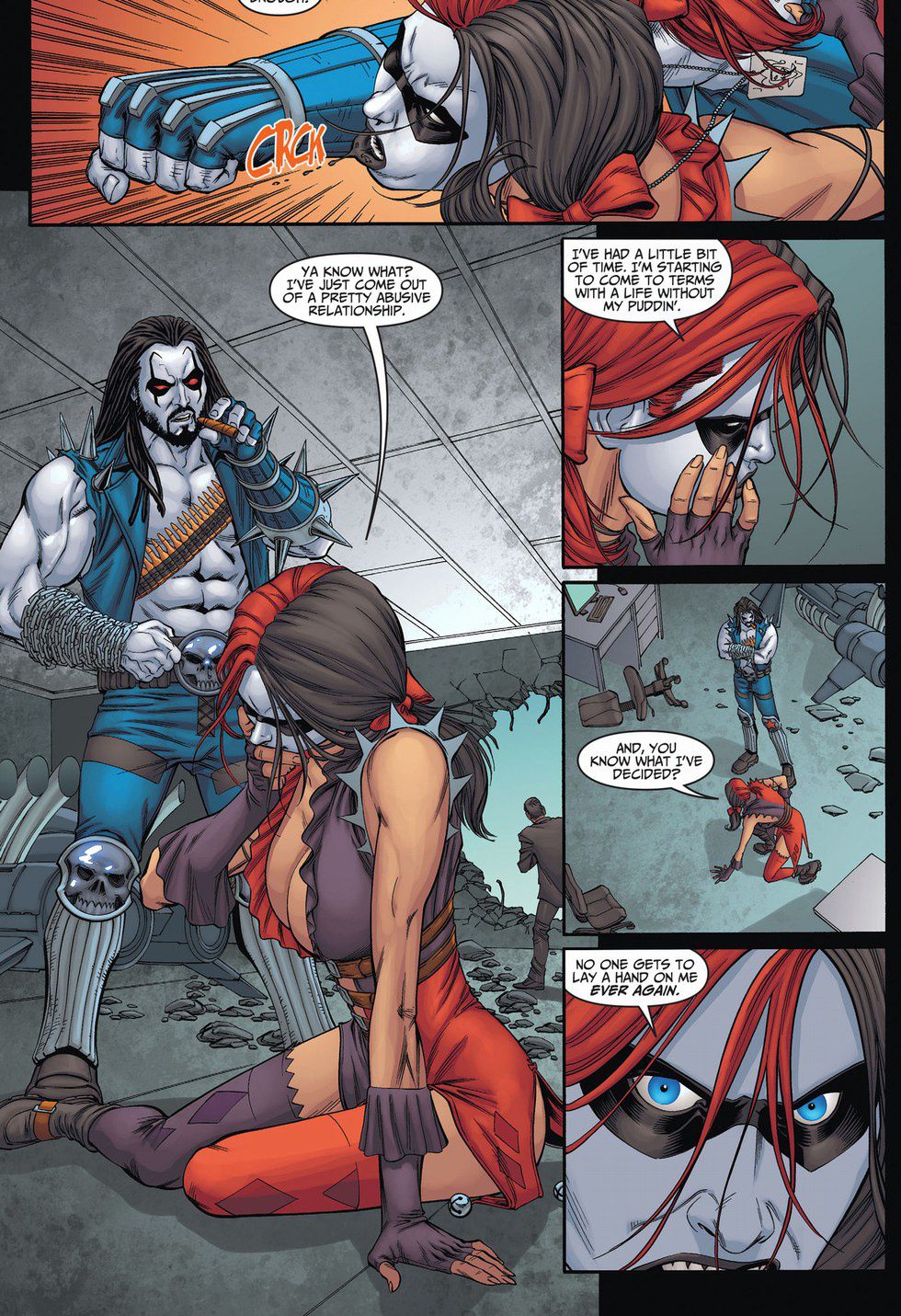Author's Note: Just wanted to warn everyone that this piece may contain spoilers to some of the comics in question and may link to potentially violent, mature or abuse-related triggering content. Also, this piece was written before viewing the "Suicide Squad" movie, thus potential incomplete info.
Comic books can shed a lot of unexpected light on aspects of the cultural zeitgeist. On the macro scale, we have pretty much every do-gooder superhero fighting America's enemies, depending on your war of choice. But shrink the scale from global conflict, and you still see some parallels between page and real life.
One of the most intriguing characters in comics is fan favorite Harley Quinn. For those unfamiliar with her origin story, let's just say a lot of it focuses on her unhealthy relationship to the Joker (more on that in a bit). But with separation from the Clown Prince by way of Kali-Ma kebab in the Injustice series or by other means in her New 52 series (more foreshadowing), Harley comes into her own as an independent character. One of the most telling moments of her individual development happens in the Injustice Year One Annual, when galactic bounty hunter Lobo tries to capture Harley. After a dispute and a punch to the face, this scene happens:
Harley then proceeds to defenestrate Lobo quite emphatically. That has nothing to do with the character development, but it was a pretty awesome response, all things considered.
The part that does matter is that Harley mentions that the relationship with the Joker was toxic. If it wasn't enough that he pretty much actively eschews common conventions of good and evil for kicks and giggles, Joker manipulated Harley in every aspect of their massively abusive relationship. Yet, she still came back to him, somehow pining even harder than she was before his most recent "expression of love." Why? There's a lot of speculation behind that, but we'll just chalk it up to what Margot Robbie calls an "incredibly dysfunctional" but ultimately "addictive" relationship.
The unfortunate truth, though, is that this kind of behavior mirrors many real-life abusive relationships. The National Domestic Violence Hotline provides many resources for those in abusive relationships, including warning signs for what constitutes abuse. I won't go into specific instances of the Joker/Harley relationship because of just how extensive that list could get. But use of physical force and mental manipulation throughout a relationship are evidence enough that this relationship was, indeed, quite toxic, as are any similar relationships in real life, even if the contexts may be different (seeing as most couples aren't supervillain clowns). Addictive nature aside, the similarities even apply to potential reasons Harley doesn't leave (scroll down to the bullet point on "Love").
Reading newer Harley comics (massive spoilers linked ahead), it's easy to spot her shift away from Clown Princess of Crime to anti-hero extraordinaire in her New 52 run and to a chaotic neutral player in the Injustice storyline - all in part to her distance from the Joker. While the loose connection she has to her deceased puddin' keeps her amidst a good/evil flux in Injustice, her solo series shows a more liberated Harley Quinn. She seems happier overall with her newfound independence as well as a newfound relationship that is as important as it is, you know, healthy.
This depiction of Harley is a big deal, especially for those who have been through similar situations in abusive relationships. Her rebirth as a new human from the ashes of an incendiary partnership could be a symbol for others to follow, whether it be in eventually leaving a relationship (hopefully sans violence) or avoiding abusive individuals all together. If this trend continues in the "Suicide Squad" movie, her role of admiration could potentially grow, psychopathy notwithstanding.
For now, though, readers see a Harley Quinn in a new relationship with even newer facets to the same identity they had grown to love. Things are looking up for her because she played her cards right. All she needed to do was shuffle out the Joker.
If you or someone you know is experience any form of abuse within a relationship, contact the National Domestic Violence Hotline at 1-800-787-3224 or via live chat. All calls and chats are confidential.




















